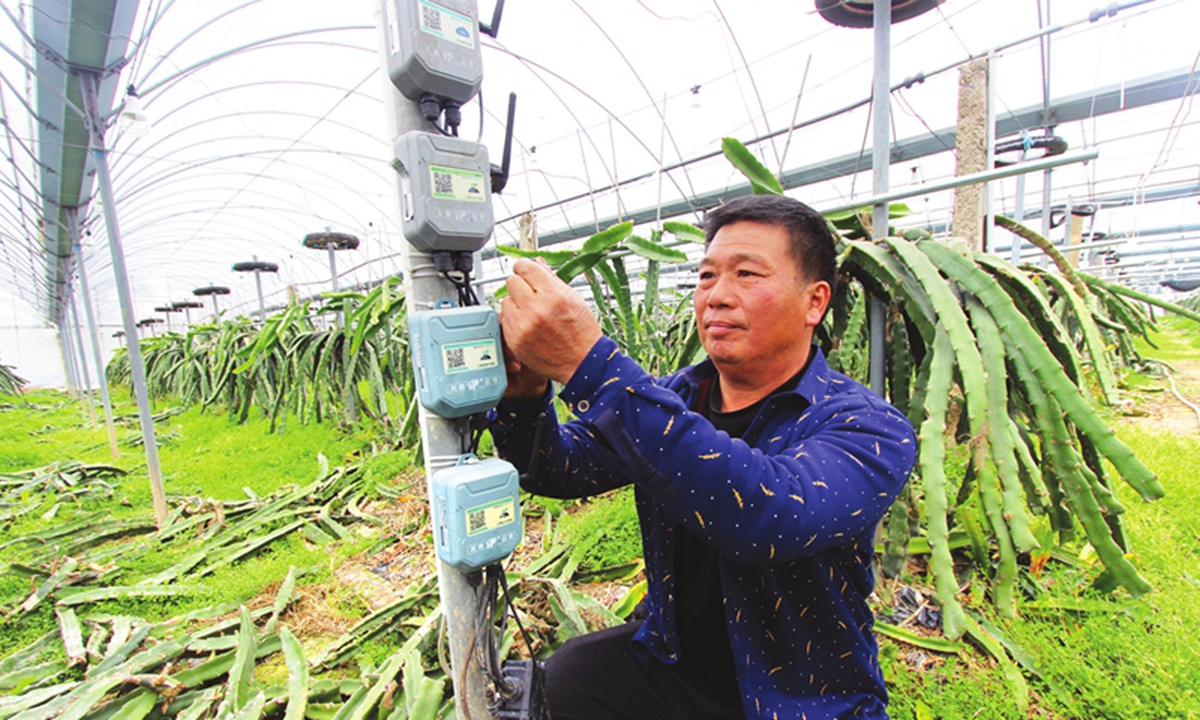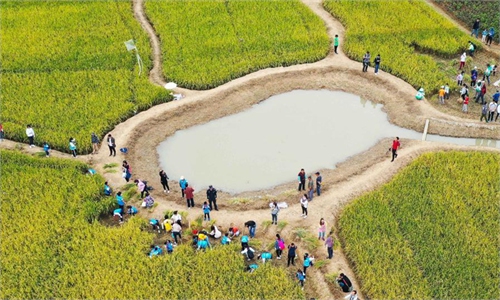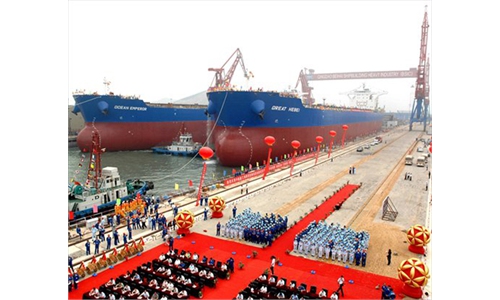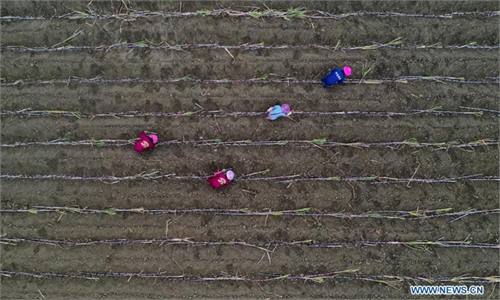COMMENTS / EXPERT ASSESSMENT
Smart farming technology can transform Chinese agriculture and help feed the planet

A rural farmer tests smart equipment inside a fruit and vegetable greenhouse in Taizhou, East China's Zhejiang Province. Photo: cnsphoto
Farmers play a vitally important role in the global community, their hard work and dedication produce the food and other essential crops that we all depend upon.Agriculture is the most basic priority of a successful society. As the famous agronomist, Nobel Peace Prize winner and "father of the green revolution" Norman Borlaug said, "Everything else can wait; agriculture can't."
Among all the nations in the world, China has the largest population and thus the most mouths to feed. The well-being of our own people depends on our ability to feed ourselves with safe, nutritious food that is grown sustainably. This is not easy, given that we have 20 percent of the world population but only 7 percent of its arable land.
China's successful development over recent years has also contributed to a shortage of good farmland as well as a strain on water supplies. Beyond our borders, the whole world faces an urgent need to collaborate on climate change and environmental protection.
In 2020, the COVID-19 pandemic also disrupted farming, reminding us of the fragility of food supply chains and their critical importance to people everywhere. Holistically, it's plain to see that a strategic approach to farming is a key route to human well-being and stability.
China's leaders are meeting these challenges head on. Today, food security is the government's primary agricultural agenda, while key demands of Chinese consumers center around food safety and quality.
At the same time, Chinese policy makers fully understand that the future of China's agriculture sector lies in agricultural modernization, and the key to advancing agricultural modernization lies in the development of technology. All are crucial imperatives for China and therefore cited in the 14th Five-Year Plan.
Current agricultural policies are aimed at improving the quality and nutrition of crops, which means teaching farmers how to maintain yields without overusing fertilizer and pesticides. China has articulated a vision for the future of agriculture. We must improve the quality of arable lands through using high quality farming infrastructure and techniques.
This is why building a modern agricultural eco-system is important and where digital and technological platform can make a huge difference, one example being that we can now provide information on local weather patterns and weed and insect threats to enable farmers to confidently increase yields and reduce pesticide use.
With modern agriculture platform and smart farming technology including drone and satellite imagery and pattern modeling, we are able to provide farmers across the country the support they need, turning farmers' mobile phones into intelligent environmental tools and resources. These transformations are already taking place and will help Chinese farmers quickly leapfrog into modern, highly efficient agricultural techniques. At the same time, reduce the use of fertilizers, pesticides and save water.
With the help of agri-tech and new business model that is driven by digital innovation through entire agricultural value chain, small farmers can benefit from a huge and supportive ecosystem. And for the consumers they ultimately serve, the system can also solve their pain points.
Modern agriculture digital services enable full product traceability, giving consumers the ability to scan a code to see information on farm location, harvest date and sustainability. This is a premium service today but could be mainstream tomorrow.
Making agricultural production more sustainable and environmentally friendly, while digitally connecting farmers to the consumers who consume their food, not only represents the trend for Chinese agriculture, but also the future of global agricultural development.
We only have one planet. We need to pay more attention to the protection of soil health and water resources, to help life on our planet co-exist with growth and to protect biodiversity.
It is important to carry out and expand farmer training and capacity building projects all over the world, using scientific and technological research and development to help farmers quickly respond to the problems encountered in agricultural production, including how to combat climate change, abnormal weather, and other challenges.
Agriculture plays an important role in tackling global climate change issues. Facing the ambitious goal of achieving carbon neutrality, the agricultural sector and leading companies shoulder great responsibilities and face great opportunities.
Enabling farmers worldwide to be more productive, more environmentally sustainable, more independent, and more risk-resilient in the face of extreme weather and disease is the key to feeding and protecting the whole planet.
The author is President of Syngenta Group China. bizopinion@globaltimes.com.cn



